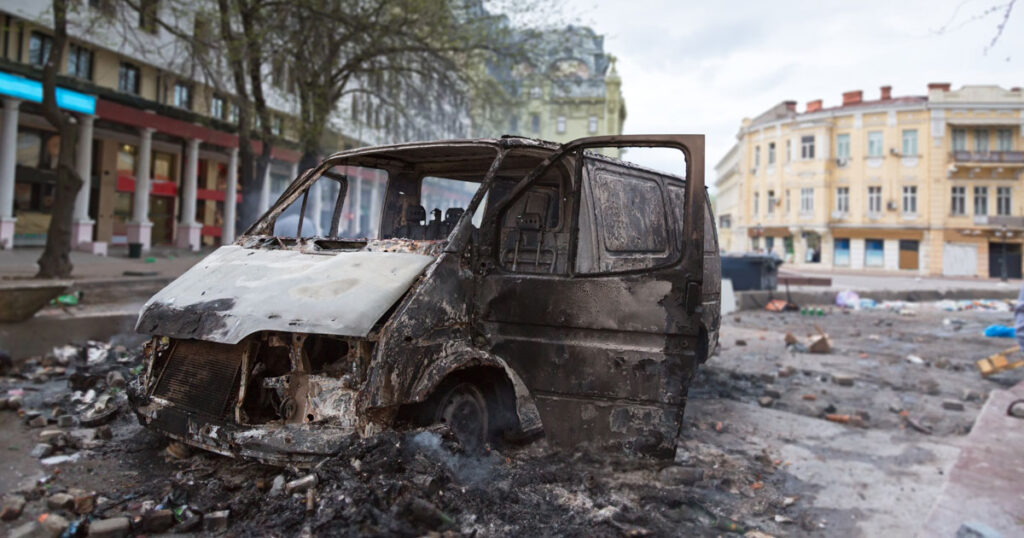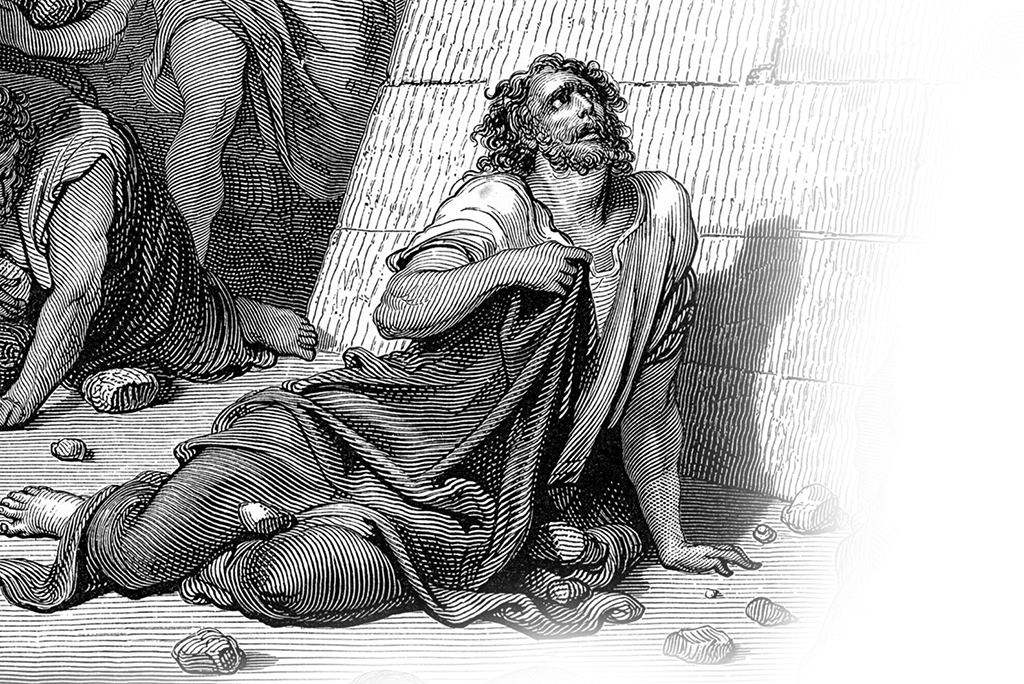Is it just? Should we be involved?
News updates tell the unfolding story: Ukraine, a fight for democracy. Mariupol razed to ground, 21,000 civilians dead. Over 4.6 million refugees, most since WWII. Civilians targeted in hospitals, residential complexes. Bomb kills 300 in theater marked “children.” Humanitarian crisis with acute shortages of food, water, heat. 900 civilians in mass graves around Kyiv, many bound and executed in Bucha. President calls war in Ukraine “genocide.” Chemical weapons alleged. War of aggression expands. Is this a just war, and should we be involved?
Christian moral reasoning looks to Christ before diving into the just war tradition. The Son of God took on flesh in the womb of the Virgin Mary to be for us both a sacrifice for sin and an example of godly living. Jesus came to bring in the kingdom of God, but He did not on that account avoid the hard questions of civil law, military service and just war.
In His redemptive words and deeds, Jesus emphasizes the priority of the kingdom of the right, His proper reign built on His atonement over Christians through the preaching of the Gospel and administration of the Sacraments. His bloody sacrifice on the cross atones for the sins of the world (Matt. 20:28). His righteousness opens the kingdom of heaven (Matt. 5:10–12, 20). His everlasting life is given in Holy Baptism (Matt. 28:19). His reconciliation empowers love even to enemies (Matt. 5:43–48). His Holy Supper grants forgiveness of sins and remembrance before the Father (Matt. 26:26–29). Christ also recognizes the rule of the kingdom of the left, God’s hidden reign over a fallen creation, in which He rules by the civil authority’s use of force, law and reason to protect bodies and possessions from harm, defend the good, restrain and punish evil, and bestow a measure of earthly justice and outward peace.
Christ thus praises a Roman centurion for his great faith and returns him to duty (Matt. 8:5–13). He places Himself under civil authority and pays the temple tax (Matt. 17:24–27). He honors civil order and its justice even to the point of submitting to a sham trial before Governor Pilate, giving testimony and yielding to the unjust punishment of crucifixion (Matt. 27:2, 11–14, 22–26).
God has both a proper, right-hand reign and a hidden, left-hand reign, and He does not allow His followers to opt out of either. The famous, failed attempt of the Pharisees to trap Jesus on whether or not it was lawful to pay taxes to Caesar deserves special note. The Jews hated the taxes levied by the Romans. The Pharisees schemed that a “do pay” answer would sever Jesus’ believer base and that a “don’t pay” answer would sever His head by Roman law. But Jesus’ answer establishes the applicability of both kingdoms, each in its order.
“Show me the coin for the tax.” And they brought him a denarius. And Jesus said to them, “Whose likeness and inscription is this?” They said, “Caesar’s.” Then he said to them, “Therefore render to Caesar the things that are Caesar’s, and to God the things that are God’s.” (Matt. 22:19–21)
Jesus’ analogy pivots on the denarius reflecting Caesar’s image and bearing his inscription. The image shows how Caesar is known, and the inscription makes the coin legal tender where he reigns. Accordingly, we honor and obey Fourth Commandment earthly authorities such as government, father and mother, for they reflect “Caesar’s image” (known by the power to protect and punish) and bear his inscription (ruling over the externals of body and goods). But even more, we honor and obey God and His preaching office, for they reflect God’s image (known by His power to save by Word and Sacrament) and bear His inscription (ruling over the internals of faith and the service of love). Both kingdoms hold, but Jesus explicitly assigns only the right as belonging to God. Where civil authority oversteps its bounds, we must obey God rather than man (Acts 5:29).
Returning to consider the Christian and just war, it is clear that there are two lines of Christian love. In the kingdom of the right, Christians honor Christ, His Means of Grace and the Gospel ethic of reconciliation. In all war — just and unjust — Christians are called to support the preaching of God’s Word, pray for friend and enemy alike, and provide for basic human needs. This line of love flows from the Gospel and moves Christian hearts. In the kingdom of the left, Christians honor God’s appointed civilian authorities and work within their vocations to support the proper work of civil authorities — to protect the good and punish the evil. This left-hand love should move civil leaders and citizens in their God-given vocations to support and exercise coercive force, if required, in accordance with law and reason.
St. Peter and St. Paul followed Christ in this two-fold approach. On the right, St. Peter and St. Paul preached the Gospel to Roman officials and Caesar’s household and prayed for them, even as they frequently persecuted the church. On the left, the apostles honored the offices of civil authority and those who occupied them, preaching obedience to them. St. Paul especially made clear the proper work of those offices — to protect the good and punish the evil (Rom. 13:1–7; 1 Peter 2:13–17). Regarding the use of coercive force, early Christians did serve as Roman soldiers, but integrating the Christian faith was hard. In A.D. 286, the entire Theban Legion, numbering at least 6,600 Christian soldiers, was martyred under Emperor Maximian Herculius for refusing to sacrifice to pagan gods (LW 45:81–129; see note 44).
For centuries, the Christian response to war addressed service in both kingdoms. In Augustine’s letters to Boniface, a jaded Roman leader ready to compromise with invading Vandal barbarians to further his career, Augustine first demonstrates his spiritual concern for Boniface by preaching the Gospel of Christ, condemning heresies and encouraging life under God’s Law. But second, Augustine charges Boniface to honor his God-given position for the defense of North Africa through rigorous military preparations and battle. Augustine says that Christians would help him spiritually: “Some, then, in praying for you, fight against your invisible enemies; you, in fighting for them, contend against the barbarians, their visible enemies. Would that one faith existed in all, for then … the devil with his angels would be more easily conquered.”[1] In his sermons in Hippo, Augustine later urged his parishioners to stand alongside the Roman soldiers to fight the barbarians, for this alone would show Christian love in time of invasion. Christians should take the attitude of David, whose brow was “marked with the humility of the cross of Christ.”[2]
To make a long and very important story short, the Christian church continued to “render to Caesar the things that are Caesar’s, and to God the things that are God’s” (Mark 12:17), engaging civil and spiritual realms in war. Luther’s trenchant just war guidance for prince and people generally followed Augustine. But the 1648 Peace of Westphalia and the rise of the modern secular state changed the just war tradition in society. The spiritual realm — the heart of man, the Gospel of forgiveness, the reconciliation in Christ and the service of love — receded from view. The focus became the moral application of coercive force with an eye toward restraining war. The motto, attributed to Augustine based on Letter 189, would be, “War is the mournful work of sustaining relative goods in the face of greater evils.” Many just war theologians followed the lead of secular moral philosophers and separated out the spiritual.
The modern approach to just war has proved quite helpful in setting criteria for justice in war. Using historic just war categories, law, reason and international agreements, the just war tradition may be summed up briefly. Between the extremes of “might makes right” (realism) and “peace at all costs” (pacifism), the state will at times use military power to achieve “a better, more just peace” (just war). Two terms describe different aspects of this approach: Jus ad bellum and jus in bello. Jus ad bellum gives criteria to the state for how it may justly decide to go to war: legitimate authority, just cause, just intent, last resort and so on. Jus in bello gives criteria to the military for how it may justly fight a war: discrimination (aiming only to kill combatants, not noncombatants) and proportionality (using weapons that cause destruction proportional to a target’s importance).
So, is the Russia-Ukraine War just? Regarding Russia’s decision to go to war, its argument that Ukrainians are actually Russians seeking the protection of mother Russia is belied by stiff Ukrainian resistance and unmasked as outright aggression. Consequently, Russia’s intent to seize territory from a sovereign state fails the jus ad bellum requirements of just cause and just intent. The Russian military’s conduct of the war appears to be morally problematic. Targeting civilians, destroying hospitals and apartment buildings, and apparently executing hostages make a mockery of the jus in bello requirement for discrimination. As for the Ukrainian side, the law of land warfare always supports the right of self-defense.
Does this mean that the USA ought to enter combat on Ukraine’s side? Here we must return to jus ad bellum analysis. In the USA, the president as commander in chief is the legitimate authority for sending troops into combat, the Congress holds the purse strings for funding war and the people by voting have the long-term power for establishing their will. U.S. leadership has charted a course to support the Ukrainian war effort with billions of dollars in aid, including weaponry and ammunition of increasing lethality but not to enter combat itself. This option honors the jus ad bellum criteria of legitimate authority, just cause, just intent and last resort, but it does not send soldiers into war to press our will by force on the adversary. So, yes, this is a just war for Ukraine, and the USA is involved but not at war.
What should the USA do going forward? Send troops to train Ukrainian forces, provide air support, fight on the ground or focus only on humanitarian aid? In a democratic republic, all citizens should enter this discussion. For Christians, this is a calling from God to consider our Ukrainian neighbors’ needs, honor law, use reason and respectfully voice our views. Parents should talk with their children. Citizens of goodwill and wisdom may disagree based on how they understand available resources, assessed risk and other priorities. Finally, citizens should talk with their representatives and vote. Christians honor God-given civil authority and do their part to defend the good, punish the evil and work toward a better, more just peace. This requires sacrificial love, especially for those in the military.
With thanks to God for such noble service, the line of love in the spiritual realm still takes precedence. By His substitutionary death, Christ has overcome all sin, death, destruction and hell itself. By His glorious resurrection, He has opened the kingdom of heaven to all believers. By His atonement, He has reconciled us with the Father and, in His love, with the entire world. In all wars, Christians first support the preaching of God’s Word on the battlefield, for He alone gives the peace that the world cannot give. In our homes and churches, we pray for an end to hostilities. We remember the soldiers, the civilians, the wounded, the dying — on both sides — before God’s throne of grace. We provide the humanitarian aid so desperately needed. The LCMS is currently working with a number of church bodies in and around Ukraine — partner churches and friends — to deliver life-giving Word and Sacrament ministry, helmets and body armor, refugee resettlement assistance, and food and water. To learn more about the work in Ukraine and to donate for those affected by this war, please visit lcms.org/ukraine.
Digging Deeper
Luther, Martin. “Temporal Authority: To What Extent It Should Be Obeyed.” In Luther’s Works. Vol. 45. Edited by Helmut T. Lehmann, 81–129. Philadelphia: Fortress, 1962.
Shaw, Jonathan E. “Moral Warriors: A Contradiction in Terms?” Concordia Theological Quarterly 82, no. 3 (2018): 247–80.
[1] Augustine, Letter 189, Nicene and Post-Nicene Fathers, vol. 1, ed. Philip Schaff (Buffalo, NY: Christian Literature Company, 1886), 553. See also Letters 185 and 220.
[2] Augustine, The Works of Saint Augustine: Sermons, vol. 2, ed. John E. Rotelle, trans. Edmund Hill (Brooklyn: New City Press, 1990), 143.
This article originally appeared in the June/July 2022 issue of The Lutheran Witness.







Currently there are numerous “just wars” being waged and “unjust wars” being endured in the world every day; those that are tribal [e.g. in Africa South America] with a smaller scale with lesser death tolls do not make them less important in deliberating a Christian response as to whether one actively defends one or supports the others, promotes physical action or spiritual. The massive scale of war [in Ukraine] by quoted numbers of people alone seems to provoke our nation to ponder its role in response; and putting aside the majority of the world media ‘spin’ which advocates [i.e. pushes] for siding with Ukraine, Jesus values the fewer dozens of lives unjustly lost in tribal “war” fought in jungles in the river regions of the Congo or Amazon, just as much as He does innocent deaths of Ukrainians and many innocent [forcefully] conscripted Russian troops. In fact literal tribal war is still being fought in Afghanistan and amongst tribes in Iraq; innocents are still dying.
In modern America we pick and choose our wars based on our ‘national security’ [at least we hope so] and not so much with a prayerful consideration of ‘just war’. US war participation now is distinctly without the weight of an Augustin influencing a Boniface, and certainly that type of weighty spiritual influence in the waging of war is more often manifested by local missionaries in the smaller less-political, and less-complicated wars.
I’m grateful for our churches response to care for refugees and other innocents affected by war, but believe we in the LCMS should be less inclined to definitively judge and determine just and unjust sides, especially in Ukraine when we in the US lack clarity of all historical and cultural context of that region in the world and cannot rightly sift through all the political motives or media-spun narratives. I’m also less inclined to apply a ‘render to Caesar what is Caesars’ axiom to our nation’s wars fought today, and our Church’s response to it with simple allegiance to it and the 4th commandment – lest we unwittingly side with nationalism instead of Christ first.
The Church sides with Jesus first, who will never diminish His love for all people seeking justice amidst every war, despite how small the scale may be in comparison to the one in Ukraine and despite how American politicians may ignore the ‘small’ wars where unjustly lives are lost [i.e. murdered].
If it is the increased death toll numbers alone that seem to determine today’s Church response to war… her attention, physical action, and spiritual response ought be in the greatest current “war” of our time, against the innocents in the womb, where tens of millions of non-combatant lives in the US, and hundreds upon hundreds of millions of non-combatant lives throughout the world have been murdered under unjust government policy.
This war against the Innocents is easier to determine the right and wrong participants and sides. It’s easier to sift through the media spin and narrative regarding this war, because principle truth from the Word of God is easily applied. This war is where the Church Militant ought enter more vigorously and with clearer conscience amongst its members. As unjust war combatants threaten lives of SCOTUS justices, and pro-Life advocates, even firebombing pro-Life offices, we ought say, ‘Yes!’ to marches, prayers, peaceful protests, communications to ‘left’ kingdom representatives, and to more vocally say ‘Here we stand!, especially for the Life in Christ to be extended toward babies [even physically in front of murder ‘clinics’].
The war in Ukraine has been made to be ‘important’ because of its large scale, and the media and some politicians say so; so we in the LCMS grapple with it – even to dedicate a response to it in our denominational publication. It’s legitimate to respond because our church members wonder about it, are stirred by “news” of it, and seek to know better how to respond individually, as Christians should. So, now we have. Truly, I’m thankful for Fr. Shaw, Fr. Hokana, et al. for their current perspectives and insights.
Now I pray our church members do not enter into knee-jerk reactions to that ‘war’, similar as in the Northwest, southern Minnesota, Texas, etc., where other ‘wars’ are ‘fought’ by church leaders inciting action for ‘justice’; some of them adding the adjectives ‘social’ and ‘racial’, as if it makes the cause for ‘justice’ more just. In those places, more and more time, energy, and finances are spent by our churches to placate standard-bearers of Critical Race Theory, LGBTQIA+ agendas, apologizing for ‘White Privilege’ even with denominational initiatives [e.g. “Lutherans for Racial Justice’, district tool kits for “Speaking… [to] Racism”], rather than to lead the Church Militant as the Lord of Heaven’s Hosts has and would with His priorities, as He clearly communicates them in Scripture.
Let us as a Christ’s Church on earth war the good war of faith; let’s storm Hell’s Gates that can’t withstand His “just war” to set [POW] captives free. He who holds the field for us is Christ’s Victor, and all who follow Him are more than victors. Amen.
I needed these readings to help my understanding of a Christian’s role during wartimes, thank you.
Our constitution states that our military is for the defense of our nation. Yet we are involved in all 102 conflicts on earth and helped instigate most of them, including poking the Bear in the recently cobbled together state of Ukraine (mostly Russian speakers) which only serves to endanger our nation (think 9/11).
Where was our (LCMS’s) voice when our country ousted the democratically elected President of Ukraine, in the 2014 coup, with 14,000 Russian Ukrainians killed cruelly by NAZIS?
Also, when the USSR folded, our Secretary of State James Baker promised Russia that the Satellite states would not become part of NATO (there was no longer need for NATO), we lied, our military/spy complex would not stand for this (lest they lose their jobs) and soon NATO was in all those countries, giving rise to Putin. Sorry, but it could be argued that both sides are on the defense.
Our coins state “In God we Trust” and not all of them have images of rulers, indeed ‘liberty’ is a big part of them.
Perhaps our last just war was started in 1775.
Christ made me/us free from sin and free to serve him.
The Spirit lead prayers at Faith Lutheran, through Pastor Josh seem to strike the right balance, there are no winners in war and we pray for the suffering.
Another LCMS Pastor during a an old testament bible study (when all wars were spiritual wars) brought up the World War One story about the Germans in a Winter stalemate holding up the banner stating ‘GOTT MIT UNS’, the Brits replied with ‘GOT MITTENS TOO’!
Our constitution implies that we would not be an invasive power abroad. I feel bad for those of us that have been sent abroad (many relatives) as cannon fodder to satiate the elite’s greed, and there is plenty to lust after in The Ukraine and Russia. We can serve our country patriotically by staying home.
I totally agree with you on this. I love our country, but it has been wrongfully involved in wars, assassinations, and removing democratically elected leaders all over the world. We must inveigh against this kind of involvement in order to express historical truth about any given war. We must begin with the truth about any specific nation, including Ukraine, before we become involved. We must rest on historical fact as Christian citizens. We have to be careful about declaring any possibly specious war as just.
The “Two kingdoms” idea is not a categorical and simplistic default position for a Christian to use as a justification to espouse blind submission to government authority. A ruthless leader may portray an unjust war as in the ‘national interest,’ and compel Christian citizens to participate on the basis of nationalism, even though the conflict is immoral and motivated by greed and power. The war itself may be a war of conquest or colonization, and even alliances and treaties do not always justify the participation of Christians. So then, what loyalty is owed to the earthly kingdom? Where does faithfulness to God and His word fit into the scenario? Following the Lord means discerning the difference and acting accordingly.
Amen to that!
The “just war” idea is fine, when it is a defensive war, as in the Ukraine, when their land was invaded by an act of Russian aggression. Seems to give one a moral justification. However, how do Christian citizens of an aggressor nation deal with being called up to fight in an unjust cause? Maybe, some German soldiers during World War Two felt conflicted between their faith, and their patriotic duty? One wonders? Go fight for Hitler? The enemies included Jews, Poles, Czechs, French, anyone in the way of the Third Reich. Earlier in history, Augustine tried to walk that line, by assuring the Roman rulers that Christians were ready to fight, despite the knowledge that Rome was a brutal empire interested in conquest and colonialization as a divine right. Closer to home, our Spanish American War was hardly a just war either, and numerous other examples exist. In my view, as a veteran of the Vietnam War, it is not so easy to understand what constitutes the “national interests” of one’s native land, but we cannot worm our way through the problem of distinguishing a just war from an unjust one by relying on the two kingdoms idea. Within the conscience of each Christian sent to war to kill strangers is the moral choice to participate or not. If the war is unjust, than there is only one kingdom we must serve, and it is the Lord’s.